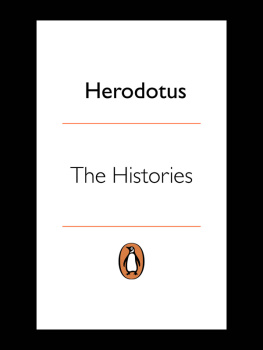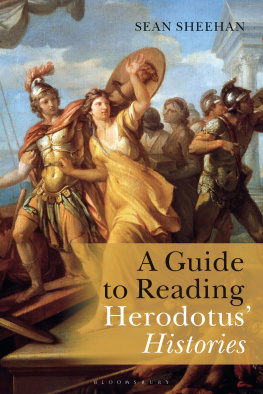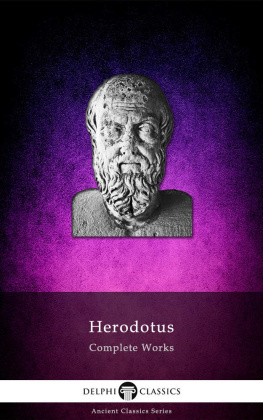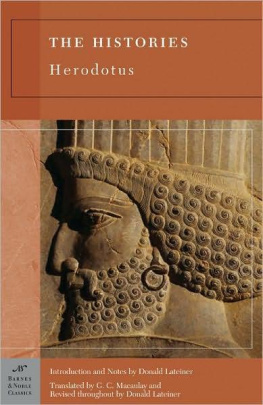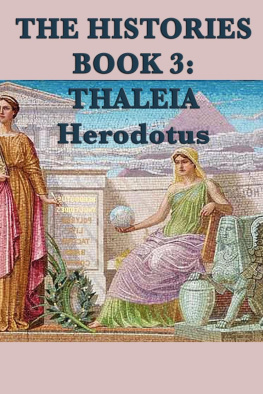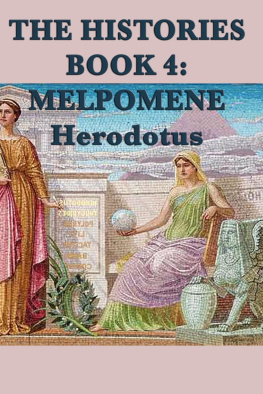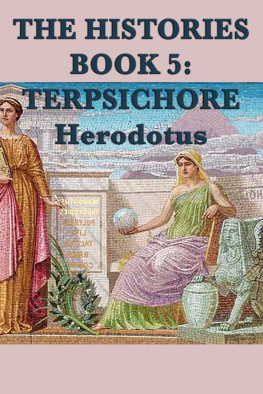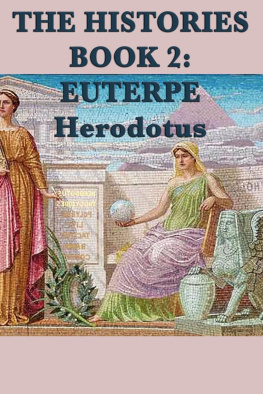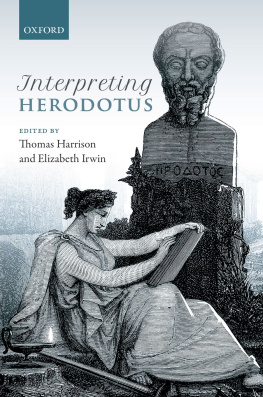ADVISORY EDITOR: BETTY RADICE
THE HISTORIES
Few facts are known about the life of HERODOTUS . He was born around 490 BC in Halicarnassus, on the south-west coast of Asia Minor. He seems to have travelled widely throughout the Mediterranean world, including Egypt, Africa, the area around the Black Sea and throughout many Greek city-states, of both the mainland and the islands. A sojourn in Athens is part of the traditional biography, and there he is said to have given public readings of his work and been friends with the playwright Sophocles. He is said also to have taken part in the founding of the colony of Thurii in Italy in 443 BC . He probably died at some time between 425 and 420 BC . His reputation has varied greatly, but for the ancients and many moderns he well deserves the title (first given to him by Cicero) of the Father of History.
AUBREY DE SLINCOURT , scholar and translator, translated Livys The Early History of Rome (Books IV) andThe War with Hannibal (Books XXIXXX), The Histories of Herodotus and The Campaigns of Alexander by Arrian, all for the Penguin Classics. He was born in 1896 and educated at Rugby, and University College, Oxford. A schoolmaster of genius for twenty-six years, he retired in 1947 to the Isle of Wight, where he lived until his death in 1962.
JOHN MARINCOLA was born in Philadelphia in 1954, and was educated at Swarthmore College, the University of Pennsylvania, and Brown University. He has taught at the College of the Holy Cross in Massachusetts, and at Union College in New York, and is currently an Associate Professor of Classics at New York University. From 1997 to 1999 he was Executive Director of the American Philological Association, and in 19992000 he was a Junior Fellow at the Center for Hellenic Studies in Washington, DC. He is the author of Authority andTradition in Ancient Historiography (Cambridge, 1997), GreekHistorians (Greece and Rome New Surveys in the Classics 31, Oxford, 2001), and of several articles on the Greek and Roman historians. He is currently at work on a book on Hellenistic historiography.
Preface
For this further revised edition, I have limited myself mainly to corrections of the translation, and to a modest updating of the Introduction (especially sections 3 and 5), the Notes, and the Further Reading. For calling my attention to errors and infelicities in the earlier edition I thank Ernst Badian, Hugh Bowden, Michael Flower, Adolfo Gmez-Lobo, John Lenz, Philip Mayerson, and Peter Rhodes. I also thank Penguin Books and especially Laura Barber, the editor of the Penguin Classics, who suggested a revision of this edition and was most helpful in its execution. The failings that persist are my own.
PREFACE TO 1996 REVISED EDITION
In writing the notes I have had in mind the interested general reader and the beginning student of Greek history. The vast scope of Herodotus work and the need to keep the notes within reasonable limits meant that I had to select rather drastically throughout. My procedure has been to comment briefly on matters about which a general reader might have questions and then to refer the reader to more detailed treatments. With very few exceptions I have limited myself to citing works in English, although the reader should be aware that much of the most important work done on Herodotus has been in other languages. I have tended towards comment on matters more traditionally historical but I have tried not to lose sight of Herodotus as an author in his own right. All dates in the book, unless otherwise noted, are BCE .
For help and advice I am indebted to Peter Lacovara, John Lenz and Mark Toher. I owe a special debt of thanks to Michael Flower, who read several drafts, corrected many errors and called my attention to bibliographic items I should otherwise have missed. Thanks are due to Union College for a leave to complete the work, and to my secretary, Mrs Marianne Snowden, for assistance in ways too numerous to mention. I thank, above all, my wife Michele, who has given intellectual, practical and moral support from beginning to end. For errors of omission and commission that remain, I alone am responsible.
Further Reading
Superscript numbers indicate the edition of the work.
1. BIBLIOGRAPHIC SURVEYS OF WORK ON HERODOTUS
L. Bergson, Herodotus 19371960,Lustrum 11 (1966) 71138
P. MacKendrick, Herodotus, 19541963,Classical World 56 (1963) 26975
, Herodotus, 19631969, Classical World 63 (1969) 3744
F. Hampl, Herodot: Ein kritischer Forschungsbericht nach methodischen Gesichtspunkten, Grazer Beitrge 4 (1975) 97136
H. Verdin, Hrodot Historien? Quelques interprtations rcentes,LAntiquit Classique 44 (1975) 66885
C. Dewald and J. Marincola, A Selective Introduction to Herodotean Studies, Arethusa 20 (1987) 940
F. Bubel, Herodot-Bibliographie 198088 (Hildesheim 1991)
2. TEXTS AND COMMENTARIES
The standard Greek text of Herodotus is that of C. Hude, HerodotiHistoriae, 2 vols (Oxford 31927). A new Teubner text by H. B. Rosn is now complete: the first volume, containing Books IIV, was published in 1987, the second in 1995.
The only complete commentary in English on Herodotus is still that of W. W. How and J. Wells, A Commentary on Herodotus, 2 vols (Oxford 1913, repr. with corrections 1928), now in many ways out of date. A complete French commentary may be found in the Bud series, 11 vols, one for each Book, together with the valuable

